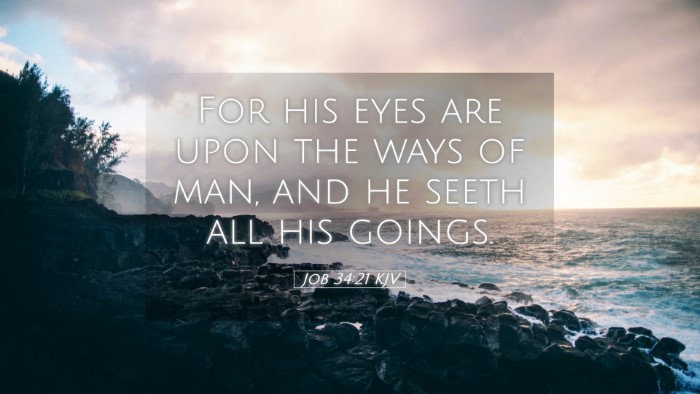Commentary on Job 34:21
Job 34:21 states: "For his eyes are upon the ways of man, and he seeth all his goings." This verse serves as a profound reminder of God's omniscience and vigilance over humanity. Below is a summary of insights from notable public domain commentaries.
Understanding God's Omniscience
Matthew Henry comments on the nature of God's watchfulness, asserting that God's eyes are "upon the ways of man," indicating that He scrutinizes both the actions and intentions of individuals. This aspect of divine oversight assures believers that nothing escapes God's notice, enhancing the gravity of our decisions and conduct.
Albert Barnes emphasizes that the extent of God's knowledge extends to all human "goings." Barnes points out that not only are our actions observed but also our paths and choices. This comprehensive awareness demonstrates that God's understanding is deeper than surface actions; it involves the principles and motives behind them.
Adam Clarke expands upon this theme by indicating that God's awareness serves as a moral compass for mankind. Clarke highlights that since God sees all, His justice is inescapable. The accountability that comes with such scrutiny should encourage believers to align their lives with God’s will, knowing they are continuously viewed in the light of divine truth.
Theological Implications
This verse contains several theological implications that merit deeper reflection:
- Divine Justice: The idea that God sees all introduces a fundamental understanding of divine justice. Both Henry and Clarke suggest that this omniscience enforces a reality where justice inevitably prevails, prompting believers to reflect on their righteousness.
- Human Accountability: The awareness of God's scrutiny serves as a means of accountability. Barnes articulates that understanding God's omniscience should deter individuals from wrongdoing and spur them towards ethical conduct.
- Encouragement for Believers: The notion that God is aware of every struggle and endeavor brings comfort to the faithful. Knowing that God sees their circumstances invokes encouragement and reassurance that He cares for their well-being, as highlighted by Clarke.
Practical Applications
The insights drawn from Job 34:21 provide various practical applications for pastors, students, and theologians:
- Integrity in Leadership: For pastors and leaders, the understanding of God's oversight should engender integrity and transparency in their ministry. Recognizing that their actions are under divine observation will motivate ethical practices.
- Personal Reflection: Students and scholars are encouraged to engage in self-examination, not just academically but in their spiritual and moral lives, as they consider how their paths align with God's expectations.
- Encouragement in Adversity: For those facing hardship, the truth that God is observing their struggles provides solace. It reassures them of God’s active involvement in their lives, as both Henry and Barnes assert.
Conclusion
In conclusion, Job 34:21 serves as a significant reminder of God’s omniscience and the constant scrutiny of human behavior. Through the reflections of Matthew Henry, Albert Barnes, and Adam Clarke, we see a multifaceted understanding of how this awareness influences our daily lives, moral compass, and relationship with God. Pastors, students, and scholars are encouraged to reflect on these insights and consider their personal paths in the light of God’s all-seeing presence.


